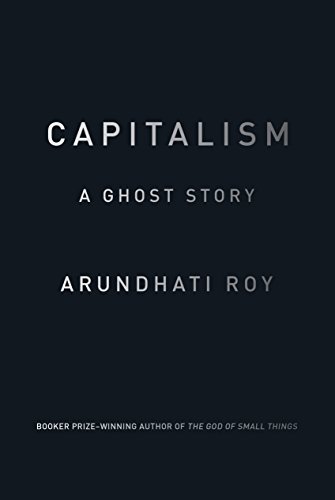Capitalism: A Ghost Story

Rating: 4.5/5
Author: Arundhati Roy
Publisher: Haymarket Books
Publishing Date: 6th May 2014
Language: English
Genre: Non-Fiction
ISBN-10: 1608463850
ISBN-13: 978-1608463855
Format: Paperback
Pages: 128
Cost: Rs. 842.79 (Kindle edition)
Plot:
Capitalism: A Ghost Story examines the dark side of democracy in contemporary India and shows how the demands of globalised capitalism have subjugated billions of people to the highest and most intense forms of racism and exploitation.
Review:
It is the story of how the largest democracy in the world, with over 800 million votings in the last election, answers to the demands of globalized capitalism, subjecting millions of people to inequality and exploitation.
Why a ghost story?
Well, from the poisoned rivers, barren wells, and clear-cut forests, to the hundreds of thousands of farmers who have committed suicide to escape punishing debt, to the hundreds of millions of people who live on less than two dollars a day, there are ghosts nearly everywhere you look in India. India is a nation of 1.2 billion, but the country's 100 richest people own assets equivalent to one-fourth of India's gross domestic product.
The author draws our attention to a number of serious problems that affect the Indian state, including the suppression of popular discontent in areas including Kashmir, Manipur, and Nagaland. As she says, “We hear about the ecological and social re-engineering of Central India only because of the mass insurrection and the war.”
Arundhati also says, “According to the rules of the Gush-Up Gospel, the more you have, the more you can.” She notes that in India, “the land of millions of people is being acquired and handed over to private corporations for “public interest” – the Special Economic Zones (SEZs), infrastructure projects, dams, highways, car manufacture, chemical hubs, and Formula One racing. (The sanctity of private property never applies to the poor.)”
Arundhati makes a very important point, when she says, “As Gush-Up concentrates wealth onto the tip of the shining pin of which are billionaires pirouette, tidal waves of money crash through the institutions of democracy – the courts, parliament – as well as the media, seriously compromising their ability to function in the ways they are meant to…”
Roy shows how the huge corporations in India exert absolute power and different NGOs to persuade government and policymaking in India.
About the Author:
Arundhati Roy was born in 1960 in Kerala, India. She studied architecture at the Delhi School of Architecture and worked as a production designer. She has written two screenplays including Electric Moon (1992) that was commissioned by Channel 4 television.
Her first novel ‘God of small things’ won the Booker Prize for Fiction in 1997. An immediate bestseller, the novel was published simultaneously in 16 languages and 19 countries but caused controversy in India for the description of a love affair between a Syrian Christian and a Hindu 'untouchable'. She is also the author of several non-fiction books including The Cost of Living (1999) - a highly critical attack on the Indian government for its handling of the controversial Narmada Valley dam project and for its nuclear testing programme; Power Politics (2001)- a book of essays; and The Algebra of Infinite Justice - a collection of journalism. The Ordinary Person's Guide to Empire was published in 2004. She has since published a further collection of essays examining the dark side of democracy in contemporary India ‘Listening to Grasshoppers: Field Notes on Democracy’ (2009).
Her latest book is ‘The Ministry of Utmost Happiness’ (2017), her second novel. It was longlisted for the Man Booker Prize and, in the US, was a finalist for the National Book Critics Circle Award. For her work as an activist, she received the Cultural Freedom Prize awarded by the Lannan Foundation in 2002.















































